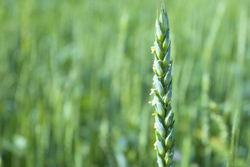Wheat enzyme genes to reduce nitrogen pollution
The overuse of fertiliser chemicals, in particular nitrogen, to boost crop yields has come under fire for two main reasons. First, direct pollution by nitrates and second, that fertiliser is usually a fossil-fuel derived product. Moreover, nitrogen is a rate-limiting and expensive element in plant growth. The EU has addressed these two threats to the environment by the Nitrates Directive and the CAP reforms respectively. Progressive enforcement will almost certainly mean a drop in the price of cereal, but may also result in a decrease in crop yield with all the attendant consequences for farmers. Scientific research funded by the EU has been promoted to help the industry to mitigate these effects. One way to address both inherent problems is to increase the nitrogen using efficiency of crops. Under the auspices of the appropriately named SUSTAIN project, partners have achieved a vital step in boosting nitrogen utilisation in wheat. The enzyme glutamine synthetase (GS) is involved with pathways that increase the efficiency of nitrogen use. Accordingly, project partners at the Royal Veterinary and Agricultural University in Denmark found and classified ten GS sequences from wheat into four sub-families. Using a combination of genomic, mapping and inheritance studies, the scientists found that there were four distinct clades when GS genes from other monocotyledonous species were included. The scientists then went on to clone the isolated GS genes. This was the first time these sequences had been identified and copied. The team then made them publicly available through the nucleotide sequence database, Genbank. This research represents a possible basis of the responsible production of transgenic crops. Cloning valuable genes for mineral utilisation in a range of crops stands to benefit the health, environment and economy of Europe as well as developing countries.







